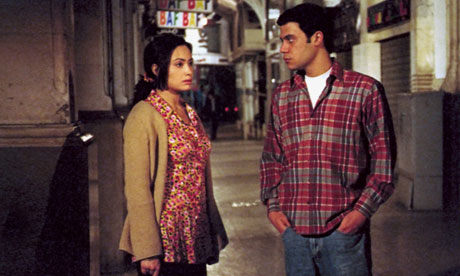
The trouble with the Arab Spring is that people who have never been to the Middle East think they know it. There is a kind of finality in rolling news footage: a moment caught within a certain political context encourages pundits and casual observers alike to make sweeping assumptions. Movies, however, have always provided, à la Cervantes, truth through lies. The new crop of popular films from the Middle East are no different: characters that start out as troubled stereotypes evolve into complex and engaging figures.
This is best exemplified in what many consider the most successful Arab film of all time, The Yacoubian Building, a Middle Eastern Rear Window made in 2006. From the eponymous apartment building's gay newspaper editor to a young woman sexually harassed at work, these characters from Alaa al-Aswany's novel had held sway with audiences in the region ever since the book's publication four years earlier. After over 30 years of Islamic preachers calling for more conservatism in film and an older generation of celebrated Egyptian actresses donning the veil, younger film directors have taken their cue from The Yacoubian Building and rebelled by going inside the home and examining contentious relationships.
Viewing patterns have also radically changed the shape of motion pictures in the Middle East. Gone are the grand movie palaces from Cairo to Beirut. Instead, mass audiences follow soap operas and DVDs at home and films now vie for the same TV-watching demographic. Even The Yacoubian Building, denuded of its gay storyline, was reconfigured for Egyptian TV as a drama serial. However its true impact will always be as the film that opened the lid on prostitution, extremism and corruption in Egypt and finally dispelled the notion of the existence of a bland monochrome Muslim culture, deeply religious, submissive and pre-modern.
Contemporary Arab movies also prove that no matter what the setting there is a globalised urban popular culture at work. An important football match can bring a teeming city of seven million, such as Cairo, to a standstill. The film One-Zero breaks many taboos because a pop bimbo who can't hold a tune becomes a passionate defender of a her profession – one that many Muslims consider akin to prostitution. Then there is the choice facing a divorced, 40-year-old, pregnant Coptic Christian who, denied the right to remarry, can either sue the ultra-traditionalist church or convert to Islam. The ability of the downtrodden to claw their way back is what comes through from One-Zero's all-woman creative team. If Tahrir Square proved anything it is that Cairo remains the city of a thousand stories and untold possibilities.
And one of them sadly happens to be the revisionism that has been taking place in the Egyptian capital since the revolution. Cairo has the largest and longest-established cinema industry in the Middle East. A noted director was recently prevented from filming in a mosque because it was deemed to be against sharia law. Conversely, Adel Imam, a known Mubarak supporter and actor "with the plasticine face" who has appeared in hundreds of films, had his conviction and three-month sentence for blasphemy in movies from over 10 years ago overturned in July. Although one proscription apparently remains in place no matter who's in power: kissing is routinely edited out of 1950s Egyptian movies so they can be broadcast on TV.
The current debate about what constitutes "Arab cinema" sums up the quandary for local audiences. In the past, they had to endure Orientalist fantasies produced by Hollywood studios. Now a story about oil and sheikhs – Black Gold, starring Antonio Banderas – is funded by Emirati money. However, like cinema anywhere, the best films from the region offer daring and artistry. It was too violent in 1976, during the Lebanese civil war, to try making a movie there. Yet Stray Bullet, from the production house of Beiruti artists Joana Hadjithomas and Khalil Joreige, imitates not only the war's murder and mayhem, the clothes of a bygone era and draconian family tensions, but also the haziness of memory – the film was shot in 16mm and blown up to grainy effect. This honouring of the past, an ability to face it head on, not censor it, will give will give Arab cinema its true direction.
• Safar: A Journey Through Popular Arab Cinema runs 21–27 September 2012 at the ICA, London. Full programme on: www.arabbritishcentre.org.uk

